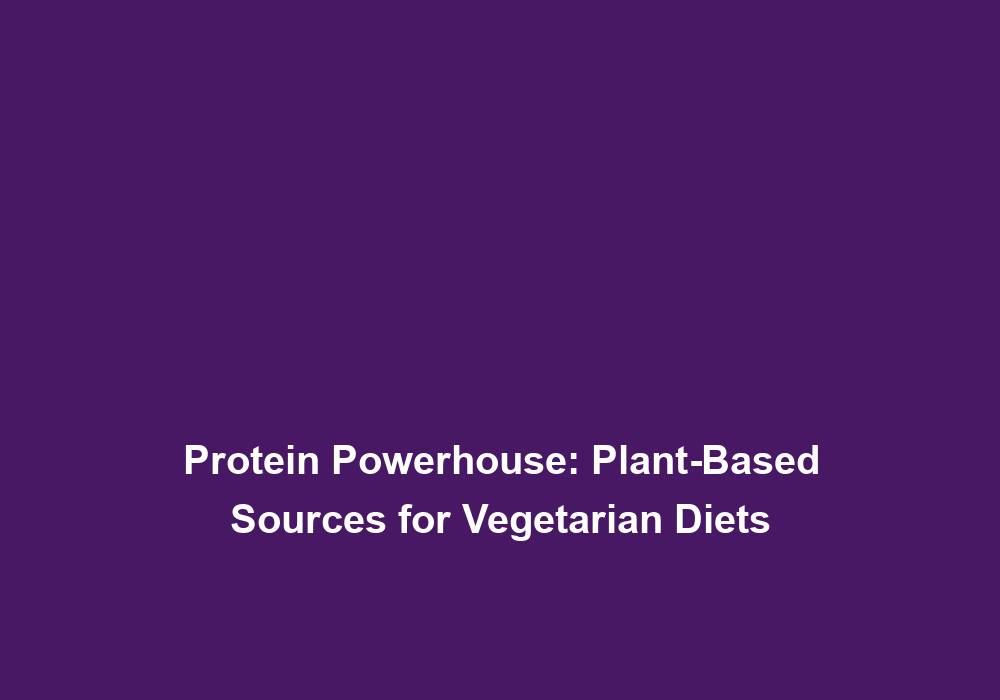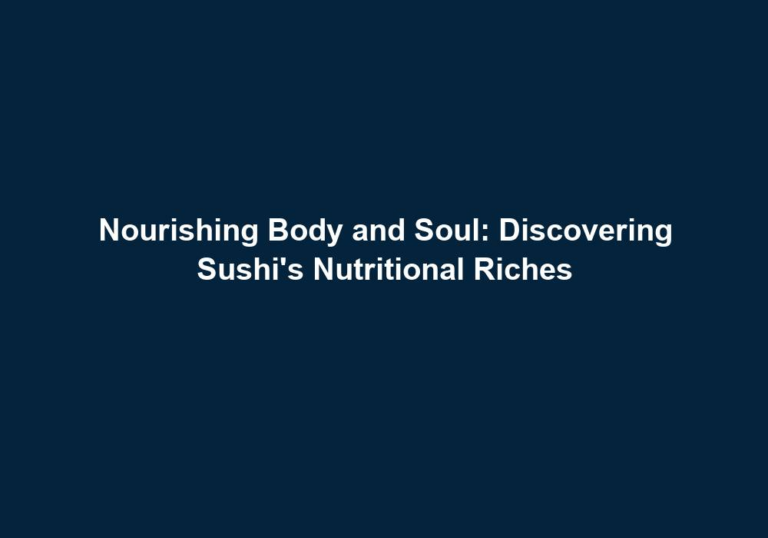Protein Powerhouse: Plant-Based Sources for Vegetarian Diets
Protein is an essential macronutrient required by the body for various functions such as muscle repair, hormone production, and enzyme synthesis. While animal-based sources like meat, eggs, and dairy products are commonly associated with protein intake, it is important to note that plant-based sources can also provide an ample amount of protein for those following a vegetarian diet. In this article, we will explore a wide range of plant-based protein sources that can be incorporated into vegetarian diets, ensuring a well-balanced and nourishing lifestyle.
Legumes: The Versatile Protein Source
Legumes are a diverse group of plants that include beans, lentils, peas, and chickpeas. These plant-based powerhouses are rich in both protein and fiber, making them an excellent choice for vegetarians. Here are some popular legumes and their protein content per cooked cup:
- Lentils: With approximately 18 grams of protein per cup, lentils are a highly nutritious and affordable option. They are also a great source of iron, folate, and fiber. Lentils can be easily incorporated into soups, stews, and salads.
- Black beans: Offering around 15 grams of protein per cup, black beans are not only delicious but also packed with essential nutrients like magnesium, iron, and antioxidants. They can be used in a variety of dishes such as tacos, burritos, and salads.
- Chickpeas: Known for their role in hummus, chickpeas contain about 15 grams of protein per cup. Additionally, they are an excellent source of folate, fiber, and manganese. Chickpeas can be roasted for a crunchy snack or used in curries, salads, and wraps.
- Green peas: These tiny green gems provide around 9 grams of protein per cup, along with vitamins A, C, and K, as well as dietary fiber. Green peas can be added to stir-fries, pasta dishes, and rice bowls for an extra protein boost.
Including a variety of legumes in your diet can help you meet your daily protein requirements while also offering an array of essential vitamins and minerals. Try experimenting with different legumes to add variety to your meals.
Nuts and Seeds: Tiny Packages of Protein
Nuts and seeds are not only a great source of healthy fats but also provide a significant amount of protein. Here are some protein-rich options to consider:
- Almonds: These nuts contain approximately 6 grams of protein per ounce. They are also rich in vitamin E, healthy fats, and fiber. Enjoy almonds as a snack or sprinkle them on top of salads and yogurt.
- Chia seeds: Just 2 tablespoons of chia seeds contain about 4 grams of protein. They are also high in omega-3 fatty acids, fiber, and antioxidants. Chia seeds can be added to smoothies, oatmeal, and baked goods.
- Pumpkin seeds: A single ounce of pumpkin seeds offers around 9 grams of protein. They are also a good source of magnesium, iron, and zinc. Enjoy pumpkin seeds as a snack or sprinkle them on top of soups and salads.
- Walnuts: With roughly 4 grams of protein per ounce, walnuts are not only a great plant-based protein source but also provide a good amount of omega-3 fatty acids. Add walnuts to your favorite salads, oatmeal, or baked goods.
Adding a handful of nuts or seeds to your meals or snacks can significantly boost your protein intake while providing a satisfying crunch. Be creative with how you incorporate nuts and seeds into your diet to add flavor and texture to your dishes.
Whole Grains: A Nutritious Protein Option
Whole grains such as quinoa, brown rice, and oats are not only rich in complex carbohydrates but also contain a fair amount of protein. Here are some protein-packed whole grains to consider:
- Quinoa: Known as a complete protein, 1 cup of cooked quinoa provides approximately 8 grams of protein. It is also a good source of fiber, iron, and magnesium. Quinoa can be used as a base for salads, served as a side dish, or used in stuffed vegetables.
- Oats: A staple breakfast option, oats contain around 6 grams of protein per cooked cup. They are also high in soluble fiber and provide a good amount of vitamins and minerals. Enjoy oats as overnight oats, oatmeal, or use them in baking recipes.
- Brown rice: While not as protein-dense as quinoa or oats, brown rice still offers around 5 grams of protein per cooked cup. It is also a rich source of fiber and various essential nutrients. Use brown rice as a base for grain bowls, stir-fries, or in stuffed peppers.
Incorporating these whole grains into your meals can not only enhance your protein intake but also provide a range of other health benefits. Experiment with different whole grains to find your favorites and incorporate them into your weekly meal plan.
Soy Products: The Complete Plant Protein
Soybeans and soy products are considered a complete protein source, meaning they contain all the essential amino acids necessary for the body. Here are some popular soy-based foods and their protein content:
- Tofu: 1 cup of tofu provides approximately 20 grams of protein. It is also a versatile ingredient that can be cooked in various ways to suit different recipes. Use tofu in stir-fries, soups, and as a meat substitute in dishes like tofu scramble.
- Tempeh: Made from fermented soybeans, tempeh offers around 30 grams of protein per cup. It is also a great source of probiotics and other beneficial nutrients. Use tempeh in stir-fries, sandwiches, and grilled dishes.
- Edamame: These young soybeans contain roughly 17 grams of protein per cooked cup. They are also packed with fiber, vitamins, and minerals. Enjoy edamame as a snack, in salads, or as a side dish.
Including soy products in your vegetarian diet can provide you with a complete protein source while offering a wide range of culinary possibilities. Experiment with different soy-based foods to find new flavors and textures in your meals.
Other Plant-Based Protein Sources
Apart from the aforementioned categories, there are various other plant-based foods that contribute to protein intake in vegetarian diets. Here are a few additional options:
- Seitan: Also known as wheat meat, seitan is made from gluten and provides around 25 grams of protein per 3.5 ounces. It is commonly used as a meat substitute in vegetarian and vegan dishes. Use seitan in stir-fries, sandwiches, and as a filling for tacos and burritos.
- Spirulina: A type of blue-green algae, spirulina contains roughly 8 grams of protein per 2 tablespoons. It is also a rich source of antioxidants, vitamins, and minerals. Add spirulina to smoothies, energy balls, or sprinkle it on top of salads.
- Nutritional yeast: Often used as a cheese substitute, nutritional yeast offers around 14 grams of protein per ounce. It is also a good source of B vitamins and minerals. Use nutritional yeast as a topping for popcorn, pasta dishes, or in homemade vegan cheese sauces.
By incorporating a variety of these lesser-known plant-based protein sources into your vegetarian diet, you can enjoy a diverse and nutritionally balanced meal plan. Explore different recipes and experiment with new ingredients to keep your meals exciting and flavorful.
Conclusion
Following a vegetarian diet does not mean compromising on protein intake. With an array of plant-based protein sources available, individuals can easily meet their daily protein requirements while enjoying a wide range of delicious and nutritious meals. By including legumes, nuts and seeds, whole grains, soy products, and other plant-based protein sources, vegetarians can create well-rounded and protein-rich diets. So, power up your vegetarian lifestyle with these protein-packed plant-based foods and embrace a healthier and sustainable way of nourishing your body.







